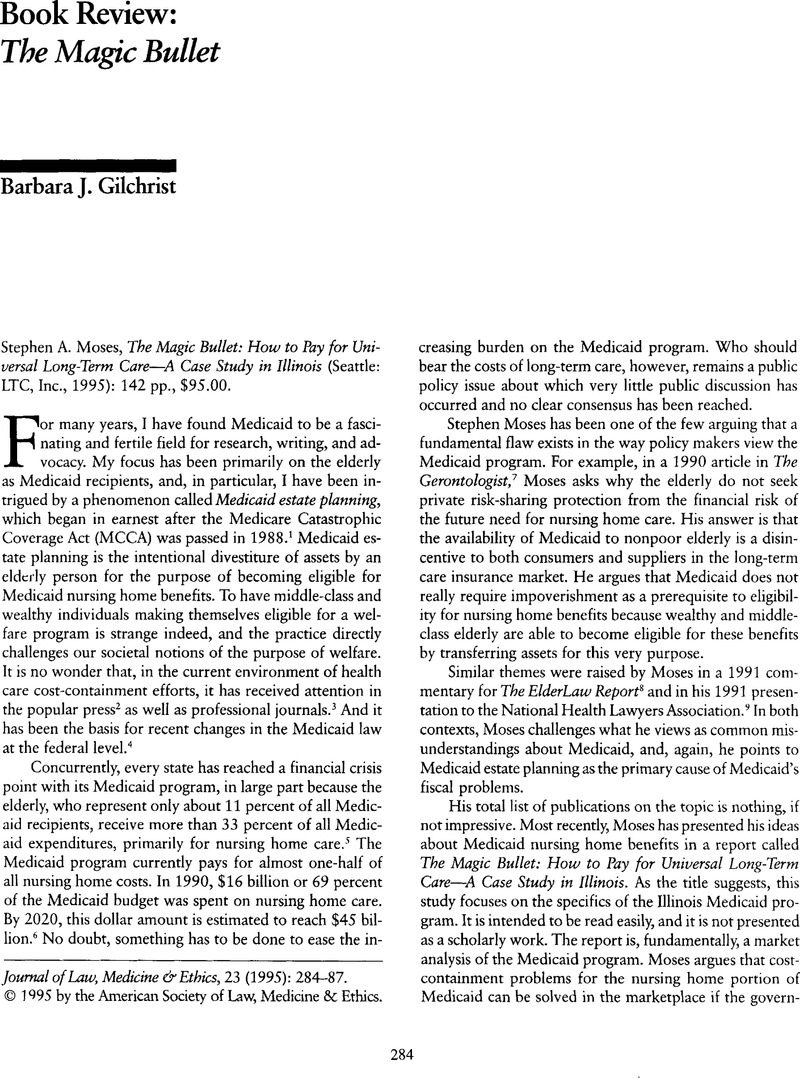No CrossRef data available.
Article contents
The Magic Bullet - Stephen A. Moses, The Magic Bullet: How to Pay for Universal Long-Term Care—A Case Study in Illinois (Seattle: LTC, Inc., 1995): 142 pp., $95.00.
Published online by Cambridge University Press: 01 January 2021
Abstract
An abstract is not available for this content so a preview has been provided. Please use the Get access link above for information on how to access this content.

- Type
- Book Review
- Information
- Copyright
- Copyright © American Society of Law, Medicine and Ethics 1995
References
42 U.S.C.A. §§ 1396–1396s (1992).Google Scholar
See, for example, Beck, Melinda et al., “Planning to be Poor,” Newsweek, Nov. 30, 1992, at 66.Google Scholar
See, for example, Gilchrist, Barbara J., “1990 Medicaid Rules for Missouri's Elderly,” Journal of the Missouri Bar, 46 (1990): 441–51; and Crosby, Eleanor M. Leff, Ira M., “Response to the Conference: Ethical Considerations in Medicaid Estate Planning: An Analysis of the ABA Model Rules of Professional Conduct,” Fordham Law Review, 62 (1994): 1503–16.Google Scholar
See testimony regarding the Omnibus Budget Reconciliation Act, 1993, “Medicare and Medicaid Budget Reconciliation: Hearing Before the House of Representatives Subcommittee on Health and the Environment of the Committee on Energy and Commerce,” 103d Cong., 1st Sess. (1993).Google Scholar
Silverman, Herbert A., “Chapter 16: Medicaid Recipients, Services, Utilization, and Program Payments,” Health Care Financing Review, Ann. Supp. (1992): 311–36.Google Scholar
U.S. Senate Special Commission on Aging, Aging America: Trends and Projections (Washington, D.C.: U.S. Dept. of HHS, 1991).Google Scholar
Moses, Stephen A., “The Fallacy of Impoverishment,” The Gerontologist, 30 (1991): 21–25.CrossRefGoogle Scholar
Moses, Stephen A., “Medicaid Estate Recovery Studies: How to Save Millions on Medicaid Long Term Care,” Long Term Care and the Law (Washington: D.C.: National Health Lawyers Association Press, 1991): 1–36.Google Scholar
Moses, Stephen A., The Magic Bullet: How to Pay for Universal Long-Term Care—A Case Study in Illinois (Seattle: LTC, Inc., 1995): At 18.Google Scholar
Id. at 20.Google Scholar
Id. at 42.Google Scholar
Sabatino, Charles P., “Medicaid Estate Recovery Under OBRA '93: Picking the Bones of the Poor?,” BIFOCAL: Newsletter of the Commission on Legal Problems of the Elderly, 15, no. 4 (1994–95): At 4.Google Scholar
The General Accounting Office has issued a report about their survey of welfare data for the State of Massachusetts. While this report contains interesting data, it only measures those elderly persons who did not adequately plan prior to making application for benefits. No measurement of the individuals who properly made transfers and then received benefits was possible given the nature of this study. See General Accounting Office, Survey of Long-Term Care for the Elderly (Washington, D.C.: GAO, GAO/HEHS-94-214R, July 21, 1994).Google Scholar




